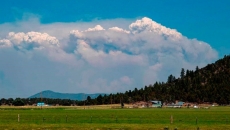The main emergency benefits lifeline for Canadians during the COVID-19 pandemic was in fact two streams processed by two different government bodies, with implications for whether seniors qualify for federal support payments, the Conservatives say.
In a letter to Seniors Minister Deb Schulte, Tory MP Rosemarie Falk says some low-income seniors "have been arbitrarily penalized" based on whether their guaranteed income supplement (GIS) came through Service Canada's employment insurance program or through the Canada Revenue Agency.
The $2,000-per-month Canada Emergency Response Benefit amounted to "two entirely different relief programs, distributed by different government agencies and with different eligibility criteria," though seniors were never informed, Falk wrote in an Aug. 9 letter obtained by The Canadian Press.
"Applicants who collected emergency benefits through the EI system may exclude this income in their statement of estimated income" — and thus avoid clawbacks on their income supplement — "while applicants who collected emergency benefits through CRA cannot," she said.
Falk called the situation "unacceptable," saying it could have been prevented with clearer communication and a more streamlined bureaucratic process.
The seniors minister's office rejected Falk's framing of how the CERB impacts the GIS — a monthly payment for low-income Canadians aged 65 and older.
"All CERB benefits were treated the same way as employment insurance in the calculation of benefits when GIS is renewed annually in July. Whether a senior received CERB from Service Canada or CRA did not affect their annual GIS renewal," spokesman Scott Bardsley said in an email.
He says Falk's claim seems to stem from a misunderstanding. In certain circumstances such as retirement or business closure, seniors on the GIS can request that their benefit be calculated based on their estimated income for the current calendar year rather than their actual income from the previous year. But CERB recipients whose payments came via the Canada Revenue Agency are not eligible, while Service Canada recipients are.
Recipients whose income was considered uninsurable — such as self-employed Canadians — collected the CERB through the CRA, while recipients with so-called insurable earnings went through Service Canada.
The cessation of Service Canada-handled CERB instalments can trigger an "option" that allows benefits payments to be excluded from recipients' declared income, according to an internal Service Canada directive obtained by The Canadian Press.
While the dual-stream complication did not come to light until this week, opposition legislators say they've been flooded with calls from Canadians aged 65 and up who suddenly saw their monthly budget tossed out the window amid drastic dips in government supports due to the pandemic relief they relied on last year.
Starr Therrien, a 63-year-old Ontario flower shop owner who lost her husband in November and was slated to receive his income supplement, finds herself cut off for the coming year from $8,400 largely due to the CERB she drew on for three months in 2020.
"Why wasn’t there a flag when people like me were collecting the CERB?" she asked in an interview.
“I know the government was really strapped for time … But there were no warnings saying, 'These are the implications, you need to be aware of this 12 months from now and how it will affect your life' — $8,400 is a lot of money, no matter who you are."
Green MP Paul Manly highlighted the "costly ramifications of forcing low-income seniors into greater poverty" in a July 29 letter to Schulte, National Revenue Minister Diane Lebouthillier and Employment Minister Carla Qualtrough.
New Democrat MP Daniel Blaikie called last week for a "prompt solution" after many seniors who received the CERB and its successor, the Canada Recovery Benefit, either do not qualify for the income supplement or face drastic deductions to it.
Like employment insurance, the guaranteed income supplement is income-tested. That means the previous year's taxable earnings — including most pandemic benefits — factor into how much gets doled out in the next payment period (recipients are notified of their entitlements each July).
"This may result in a loss of entitlement if the person's income (or joint income, where applicable) exceeds the threshold at which GIS benefits are completely phased out," said Employment and Social Development Canada spokesman Samuelle Carbonneau in an email last week.
The split-program wrinkle added another line to a sometimes garbled calculation.
"For simplicity of communication to the public, the two programs were communicated as one Canada emergency response benefit. The objective was to ensure that Canadians applying for either income support … were treated in a similar manner," states a May 12 note in the Canada Gazette, the official record of government decisions.
As CERB began to roll out, information relayed by CRA call centre agents on self-employment income was "unclear and incorrect," resulting in improperly stated earnings, the note says.
Jack Partridge, 77, said he lost $350 in monthly GIS after drawing on four months' worth of CERB when his hours were severely cut back at the technical sales centre where he does maintenance and warehousing work.
"I was never told," said the resident of Brantford, Ont.
"They say it’s going to all even out in 2021. That may be fine and dandy from their standpoint. But it's not fine and dandy from my standpoint."
For single seniors, GIS benefits kick in if they make less than $18,984 annually, with a monthly maximum of $936. The eligibility threshold for couples is $45,504.
Data on the total number of GIS recipients who had their payments reduced this year is not currently available, Carbonneau said.
Seniors continue to receive their full old age security and CPP pensions.






